Energy companies face unique operational challenges: from managing utility infrastructure and regulatory compliance to coordinating field service teams and handling complex billing structures. Generic CRM software wasn’t built for this reality, leaving critical gaps between customer service, field operations, and sales teams.
A purpose-built CRM for energy companies solves these challenges by centralizing customer data, automating utility-specific workflows, and connecting every department.
This guide explores how energy-focused CRM platforms transform operations for utilities, renewable energy providers, and power companies. We’ll review the top 10 platforms built to handle utility operations, outline the essential features your team needs and give you a practical framework for selecting the right CRM to unify your energy business.
6 ways CRM transforms energy operations
Coordinating field crews while navigating a labyrinth of regulations is the daily reality for energy teams, a task made nearly impossible by disconnected systems. A purpose-built CRM dissolves these barriers, transforming operational challenges into avenues for growth by unifying every facet of the business. It connects all parts of your organization, enabling teams to work faster, smarter, and deliver the exceptional service your customers deserve.
1. Create a single source of truth for every customer interaction
A modern CRM serves as the central nervous system for your energy team, tracking every customer interaction in one place. It transforms scattered data points across residential, commercial, and industrial accounts into a clear, unified picture. This complete view empowers your team to move with greater speed and serve customers with unwavering confidence.
2. Streamline operations across all departments
Siloed departments create friction, turning simple issues into major headaches for both staff and customers. By bringing all departments (from customer service to field ops)onto a single platform, information flows freely. When an outage occurs, your team isn’t scrambling for answers; they’re aligned, informed, and moving as one cohesive unit.
3. Deliver exceptional customer experiences
Exceptional service transcends account numbers; it requires a deep understanding of the customer. monday CRM consolidates every interaction, service history, and usage pattern into one transparent view, empowering your team to deliver truly personalized support. This allows you to shift from reacting to problems to proactively anticipating needs, making customers feel genuinely valued and understood.
4. Accelerate sales and quote generation
Your sales team’s momentum shouldn’t be stalled by complex quotes and protracted approval cycles. A modern CRM automates the heavy lifting by generating accurate quotes and tracking regulatory steps, freeing your team to concentrate on what they do best: building relationships and closing deals faster.
5. Minimize customer churn with proactive service
Instead of waiting for a customer to express dissatisfaction, you can act preemptively. monday CRM helps you identify the early warning signs of churn by analyzing data from service calls to shifting usage patterns. This intelligence provides your team with the necessary foresight to intervene with the right solution at the right moment, converting at-risk accounts into loyal advocates.
6. Unlock new revenue streams
Within your customer data lies a goldmine of opportunity, from promoting energy efficiency programs to facilitating EV infrastructure. A modern CRM helps you connect these dots, revealing cross-sell and upsell chances that might otherwise go unnoticed. It empowers your team to discover and capture entirely new revenue streams beyond serving existing needs.
Try monday CRMMust-have features for energy CRM solutions
In the energy sector, a CRM is the engine driving your entire operation. With the pressure of managing complex regulations and coordinating large-scale field teams, a generic solution simply won’t cut it.
Your team needs non-negotiable features that enable them to work faster, smarter, and stay ahead of the competition. These are the capabilities that transform operational challenges into opportunities for your team to excel.
Compliance management and data security
Navigating the intricate maze of energy regulations can feel like a full-time job, but it doesn’t have to be. A modern CRM embeds compliance directly into your daily workflow with powerful audit trails and robust security controls that let your team operate with confidence. With monday CRM, you get enterprise-grade security that protects sensitive data, freeing you to focus on your customers instead of compliance checklists.
Workflow automation for field services
Connecting your customer service team with field crews should be seamless, not a frustrating game of telephone. When a customer call comes in, the automations activate instantly: creating work orders, dispatching the right technician, and keeping every stakeholder informed. The result? Faster response times and a perfectly coordinated team that turns potential headaches into successful outcomes.
Integration with utility systems
Your team relies on specialized systems, and your CRM should be the central hub connecting them all. monday CRM ensures information flows seamlessly between your most critical platforms:
- Customer Information Systems (CIS): For seamless billing and account management.
- Advanced Metering Infrastructure (AMI): To process smart meter data without a hitch.
- Outage Management Systems (OMS): To coordinate restoration efforts in real time.
- Geographic Information Systems (GIS): For mapping assets and supporting field ops.
- Enterprise Resource Planning (ERP): To keep financials and business processes in sync.
When your systems communicate effectively, your team gets a single source of truth that simplifies everyone’s job and breaks down silos for a unified, efficient operation.
Advanced analytics and forecasting
What if you could predict future energy demand with confidence? Advanced analytics and forecasting give your team exactly that. Accurately predict peak demand, optimize resource allocation, and identify maintenance needs before they become problems. These AI-powered insights empower your team to make proactive decisions that keep you ahead of the competition.
Try monday CRM10 top CRM for power companies reviewed
The power industry demands more than a digital rolodex. It requires a CRM that serves as your central command hub, driving deals through long sales cycles, complex regulations, and high-stakes infrastructure projects.
We evaluated these platforms on what matters most: which ones actually empower your team to win? We focused on tools that streamline complex projects, automate tedious tasks, and give you the flexibility to manage every deal in your pipeline, helping you build a more connected sales engine.
1. monday CRM
monday CRM helps energy companies transform their customer relationships with AI-powered tools and a visual, no-code platform that adapts to complex workflows. Because it’s built on the flexible monday.com Work OS, teams can customize it for everything from service requests to field team coordination: all without needing technical resources.
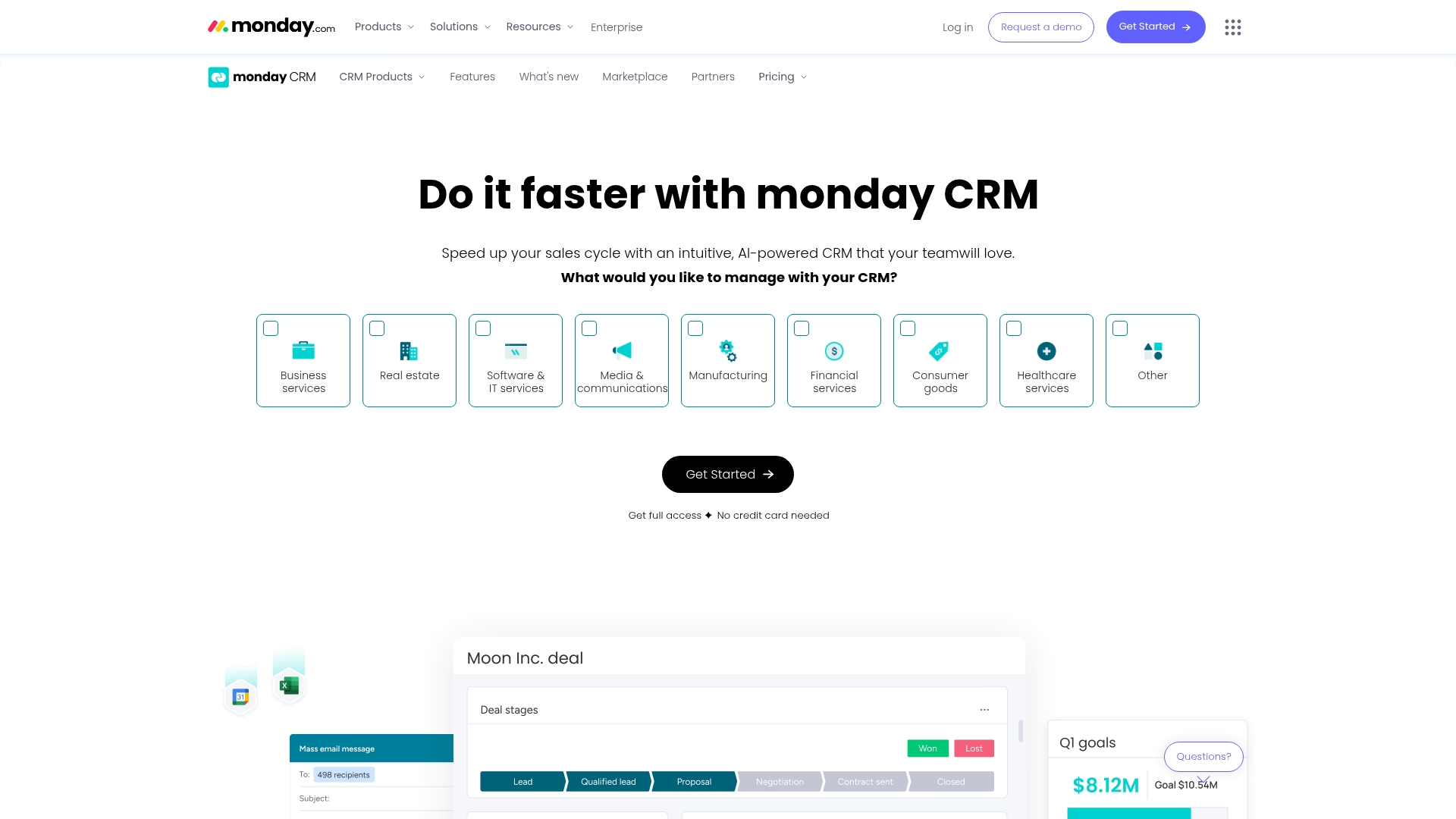
monday CRM empowers energy companies to streamline customer communications, automate service request workflows, and coordinate field operations through customizable pipelines that require zero coding expertise.
Key features:
- Visual pipeline management with drag-and-drop deal progression and unlimited customization options
- AI-powered email composition, task generation, and content summarization for faster customer responses
- Robust mobile app that keeps field teams connected and allows them to manage customer interactions on-site
Pricing:
- Basic: $9/month per seat (billed annually)
- Standard: $12/month per seat (billed annually)
- Pro: $19/month per seat (billed annually)
- Enterprise: Contact sales for custom pricing
- Minimum of 3 user seats required for all paid plans
- Annual billing saves 18% compared to monthly rates
- Nonprofit discounts available
Why it stands out:
- Complete customization without development requirements allows energy teams to build workflows that match their unique operational needs.
- AI integration accelerates customer communication and automates routine tasks like service request categorization.
- A powerful mobile app keeps field teams connected and productive during on-site customer visits.
Advanced AI features:
- Smart task generation: Converts meeting outcomes and customer interactions into actionable follow-up tasks that move deals forward automatically.
- Intelligent content creation: Generates personalized emails, summarizes call transcripts, and creates polished customer communications using natural language processing.
- Predictive analytics: Uses AI to help analyze customer behavior patterns and identify trends, giving you a clearer view of potential customer needs.
Automations:
- One-click workflow builders: Create automated sequences for lead assignment, service request routing, and customer follow-ups without any coding knowledge.
- Enterprise-scale processing: Handle up to 250,000 automation actions monthly on enterprise plans, supporting large utility operations and complex customer workflows.
- Smart notifications: Automatically alert team members about critical customer issues, service outages, or high-priority accounts based on customizable triggers.
Integrations:
- Seamless connectivity: Connect with existing energy management systems, billing platforms, and field service tools through robust API access and pre-built connectors.
- Popular enterprise tools: Integrate directly with Gmail, Outlook, Slack, Zoom, and other essential business applications your energy team already uses.
- Third-party flexibility: Access an extensive integration marketplace with 250+ available connections to streamline data flow across your entire tech stack.
Customizable energy sector workflows:
- Outage management: Build custom workflows to automate customer communications during service disruptions, track resolution progress, and provide real-time updates.
- Field service coordination: Customize the platform to manage technician schedules, track equipment installations, and coordinate customer appointments through mobile-friendly interfaces.
- Regulatory compliance: Set up custom fields and automations to monitor customer interactions, document service history, and maintain audit trails that help meet industry compliance standards.
2. Salesforce Energy and Utilities Cloud
Specifically engineered for the energy and utilities sector, Salesforce’s platform excels at unifying customer data across billing, service, and operational systems. This makes it an ideal choice for utilities aiming to modernize customer engagement while ensuring strict regulatory compliance.
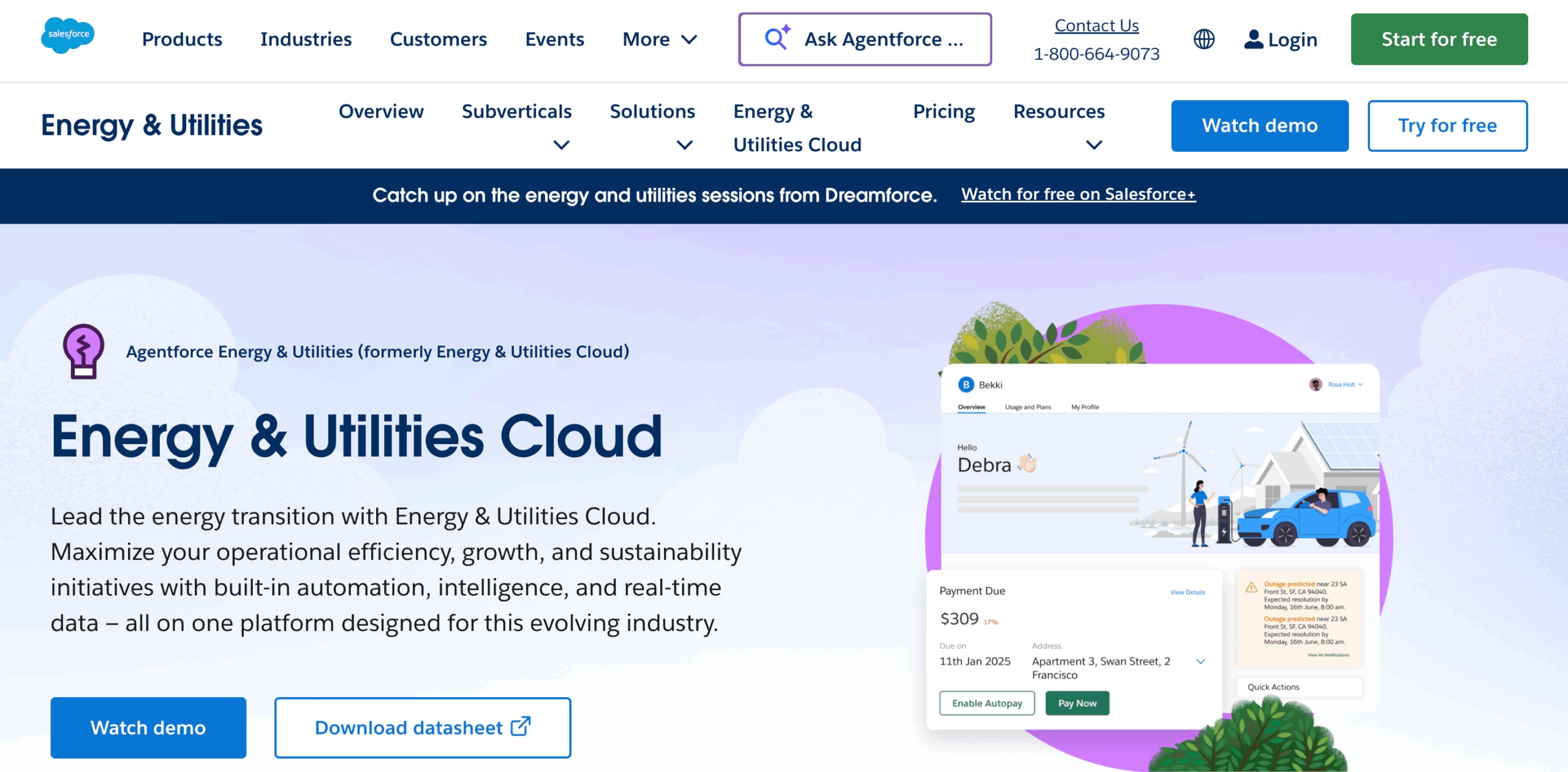
Salesforce Energy and Utilities Cloud provides a 360-degree customer view by integrating smart meter data, billing history, and service requests into a single platform for personalized customer engagement.
Key features:
- Utility 360 Console: Central hub for customer service agents with comprehensive interaction history, usage patterns, and billing data
- OmniChannel Engagement: Seamless customer interactions across phone, email, chat, and self-service portals with consistent experience
- Configure, Price, Quote (CPQ) for Energy & Utilities: Industry-specific quoting tool for complex scenarios like multi-site accounts and commodity pricing
Pricing:
Pricing information is not publicly listed and requires contacting Salesforce sales directly. Custom pricing based on organization size, features needed, and implementation requirements. Additional costs may apply for implementation, customization, and ongoing support services.
Considerations:
- High implementation complexity: Requires significant investment in time and resources for setup, customization, and integration with existing utility systems
- Premium pricing structure: Total cost of ownership can be substantial for smaller utilities, especially when factoring in licensing, implementation, and ongoing maintenance costs
3. Microsoft Dynamics 365
Harnessing the power of its extensive ecosystem, Microsoft Dynamics 365 provides a unified CRM and ERP platform that infuses AI-powered business applications into energy company operations. The platform’s strengths lie in its deep integration with other Microsoft products and its enterprise-level capabilities, making it a strong fit for large energy organizations with sophisticated business processes and complex regulatory demands.
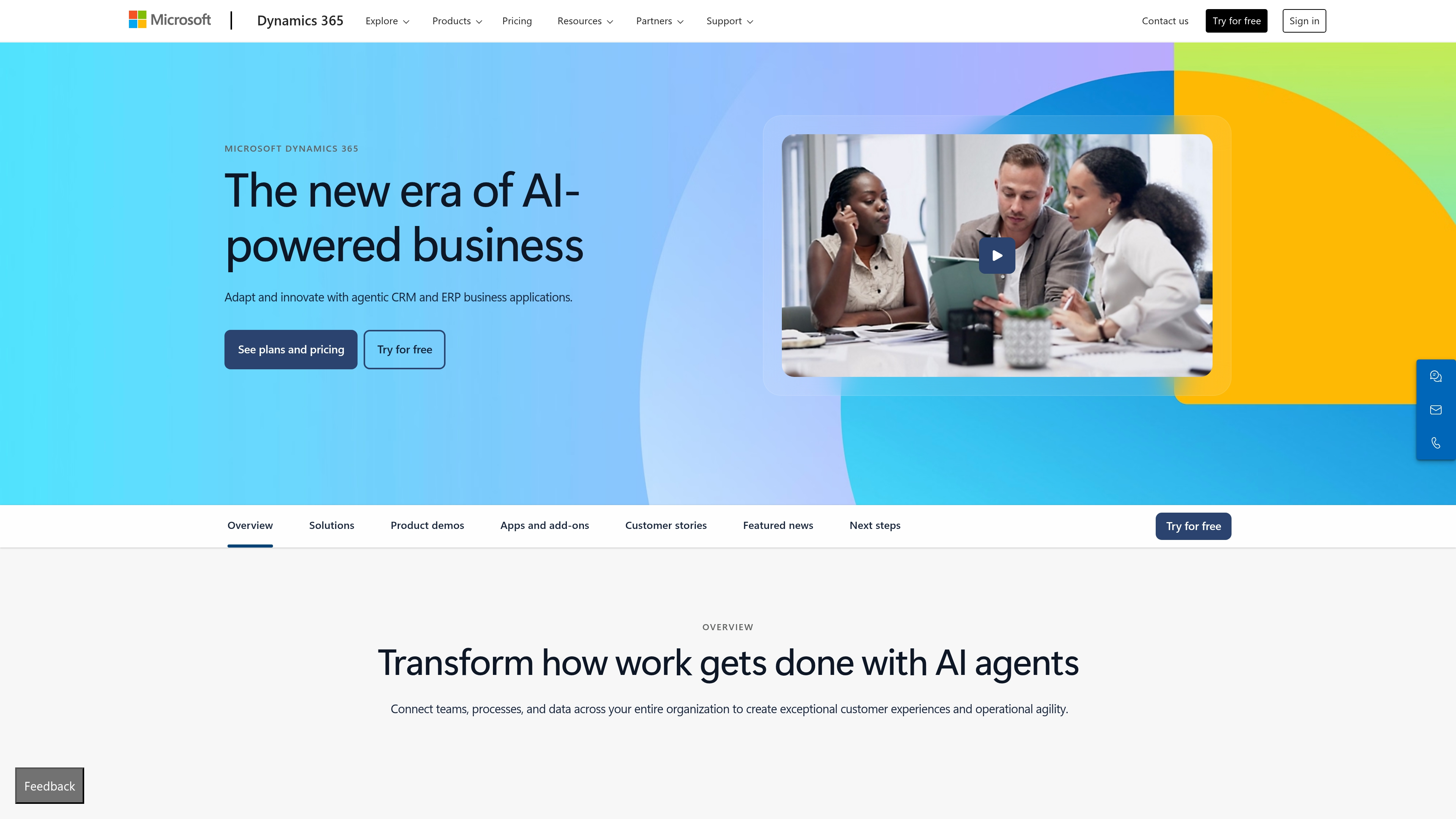
Microsoft Dynamics 365 excels at connecting energy companies’ front-office and back-office operations through a single platform that handles everything from customer service to field operations while maintaining compliance with industry regulations.
Key features:
- AI-powered insights and automation to streamline workflows and enhance customer engagement
- Unified platform combining sales, marketing, customer service, and field service applications with real-time insights
- Deep Microsoft integration seamlessly connecting with Office 365, Power BI, Azure, and LinkedIn Sales Navigator for enhanced productivity
Pricing:
Pricing information for Microsoft Dynamics 365 CRM applications was not available in the provided research. Contact Microsoft directly for enterprise pricing details and licensing options.
Considerations:
- Complex initial setup and customization process can be time-consuming and may require dedicated IT support or implementation partners
- Steep learning curve for users new to CRM platforms or the Microsoft ecosystem, potentially slowing adoption across energy teams
4. Oracle NetSuite
Oracle NetSuite distinguishes itself by offering a unified business management suite that natively combines CRM with robust ERP capabilities, a crucial advantage for energy companies. The platform is engineered for seamless data integration across all business functions, making it particularly suitable for energy organizations that manage complex billing structures and demanding regulatory requirements.
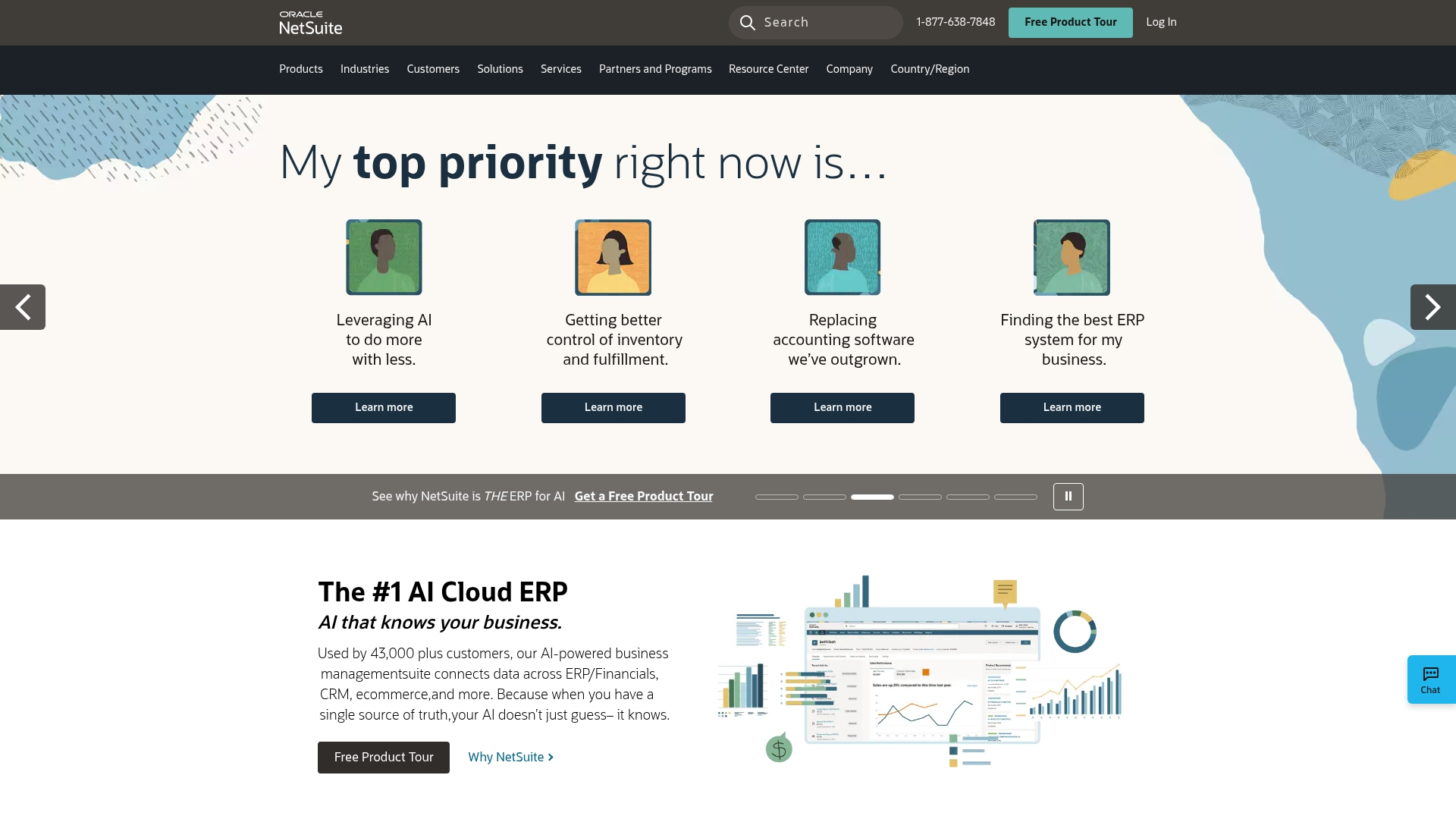
NetSuite provides energy companies with a single source of truth for customer data that flows seamlessly across sales, finance, operations, and regulatory reporting functions.
Key features:
- Integrated ERP and CRM: Native integration eliminates data silos between customer management and financial operations.
- Complex billing management: Handles sophisticated energy billing structures, including usage-based pricing and regulatory fees.
- Real-time financial reporting: Automated compliance reporting for energy sector regulations and audit requirements.
Pricing:
NetSuite provides custom quotes based on each company’s specific needs, so you’ll need to contact them directly for exact figures. However, here’s a general breakdown based on industry estimates:
- Estimated base license: Third-party sources suggest pricing starts around $999/month.
- Per-user fees: Additional costs apply for each user accessing the system.
- Implementation fee: A one-time setup cost is required for initial configuration.
- Optional modules: Additional CRM functionality is available as add-on licenses.
Considerations:
- High total cost of ownership: The combination of platform fees, per-user costs, and implementation expenses can be a significant investment for smaller energy companies.
- Complex implementation: The comprehensive nature of the platform often requires extensive customization and longer deployment periods.
- Steep learning curve: With so many features packed in, the platform can require significant training for new users to master.
5. HubSpot CRM
Known for its powerful inbound marketing and sales capabilities, HubSpot CRM provides a comprehensive platform designed to attract, engage, and delight customers. Its specialty is unifying marketing, sales, and service data into one accessible location, which is particularly valuable for energy companies managing customer education campaigns and renewable energy lead generation. With a robust free tier and AI-powered features, HubSpot lowers the barrier to entry for organizations looking to modernize their CRM without a large initial investment.
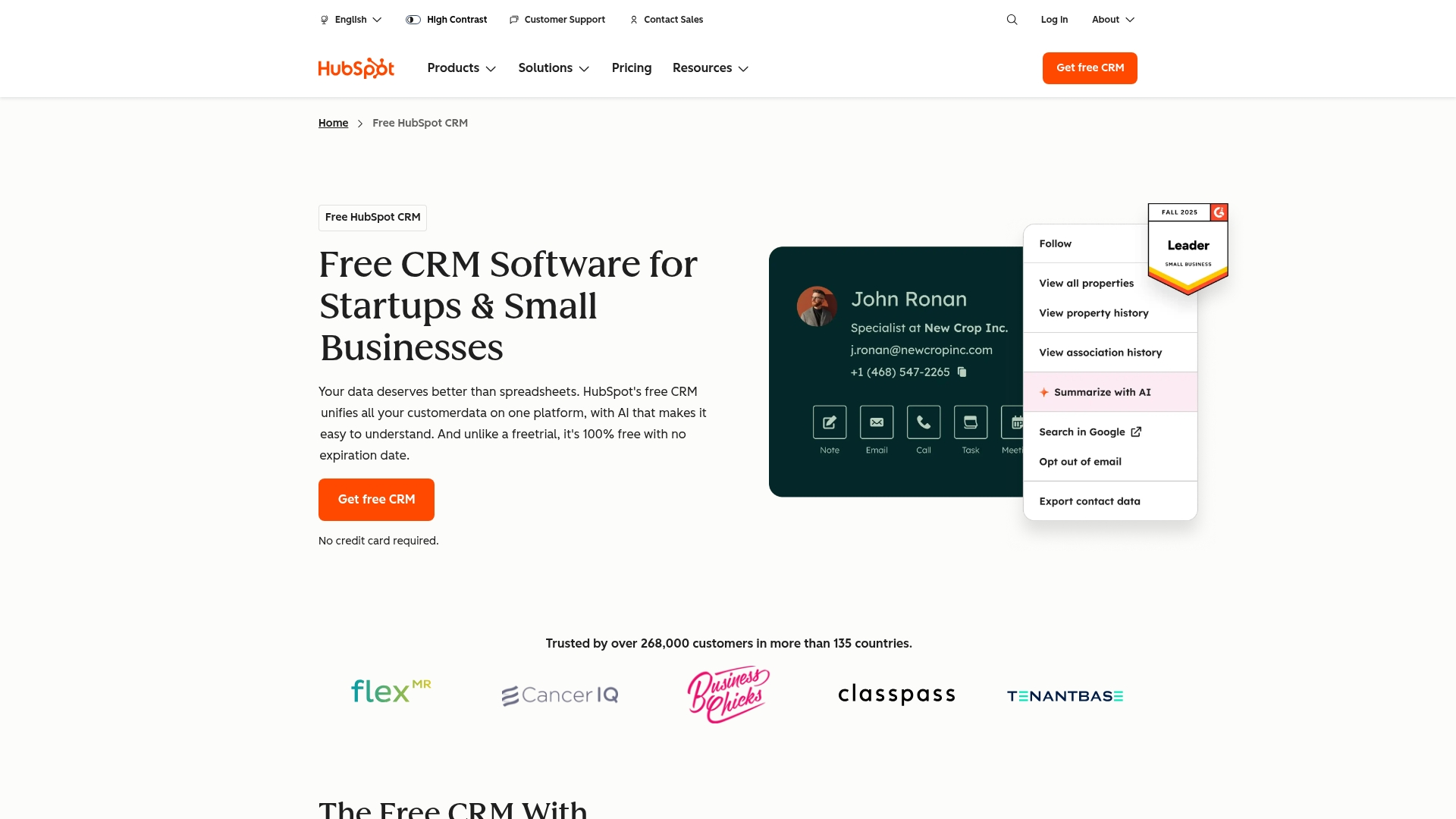
HubSpot CRM excels at managing complex customer education journeys and lead nurturing campaigns, making it ideal for energy companies promoting renewable energy programs or utility services that require extensive customer onboarding.
Key features:
- Marketing automation workflows that nurture leads through educational content about energy efficiency programs and renewable energy options
- Pipeline management with visual deal tracking to monitor energy project proposals from initial consultation through installation and activation
- Integrated content management system for creating and distributing educational materials about energy conservation, billing changes, and new service offerings
Pricing:
- Free CRM: HubSpot offers a robust free plan that includes foundational CRM tools, making it easy to get started.
- Paid Plans: For more advanced features, paid plans like Starter, Professional, and Enterprise are available. Pricing varies depending on the specific product suite and contact tier, so it is best to visit the official HubSpot website for the latest information.
Considerations:
- Limited utility-specific features like outage management, meter reading integration, or regulatory compliance tracking that energy companies typically require
- Pricing can escalate quickly as contact databases grow, which may become expensive for utilities managing large residential customer bases
6. Zoho CRM
Zoho CRM offers a feature-rich customer relationship management solution at a highly competitive price point, making it an attractive option for growing energy companies. The platform’s strengths are its deep customization capabilities and seamless integration with over 50 other business applications, which is ideal for energy firms needing flexible workflows without a large budget.
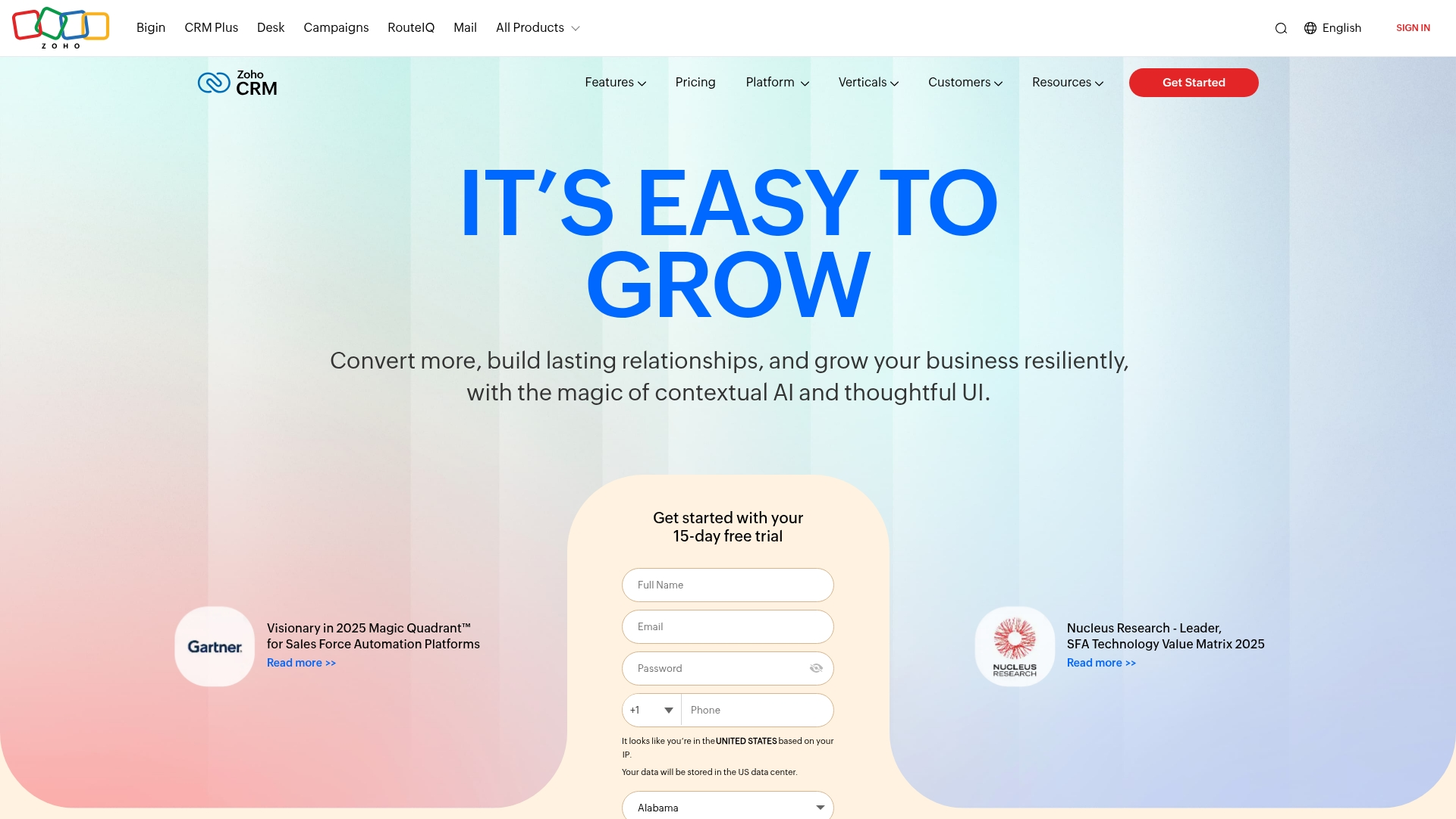
Zoho CRM empowers smaller energy companies to compete with enterprise-level functionality through affordable pricing and extensive customization options that adapt to unique industry workflows.
Key features:
- AI-powered assistant (Zia) provides predictive analytics, lead scoring, and intelligent insights for energy sales forecasting
- Blueprint process management enforces structured sales workflows and compliance requirements critical in energy sector deals
- Comprehensive integration ecosystem connects with energy-specific third-party systems and the broader Zoho suite of business applications
Pricing:
- Free Edition: Free for up to 3 users with basic lead management and mobile access
- Standard: $14/user/month billed annually
- Professional: $23/user/month billed annually
- Enterprise: $40/user/month billed annually
- Ultimate: $52/user/month billed annually
- Team Users (add-on): $9/team user/month for non-sales users
- All paid plans include free trials, with local taxes charged separately
Considerations:
- Advanced customization features can be overwhelming for new users and require significant setup time
- Performance may lag when handling large datasets common in enterprise energy operations
7. Pipedrive
Pipedrive is a popular, user-friendly CRM that excels at visual sales pipeline management. While it’s built for sales teams across all industries, its focus on activity-based selling and intuitive drag-and-drop deal tracking makes it a fantastic choice for energy companies navigating complex, multi-stage deals.
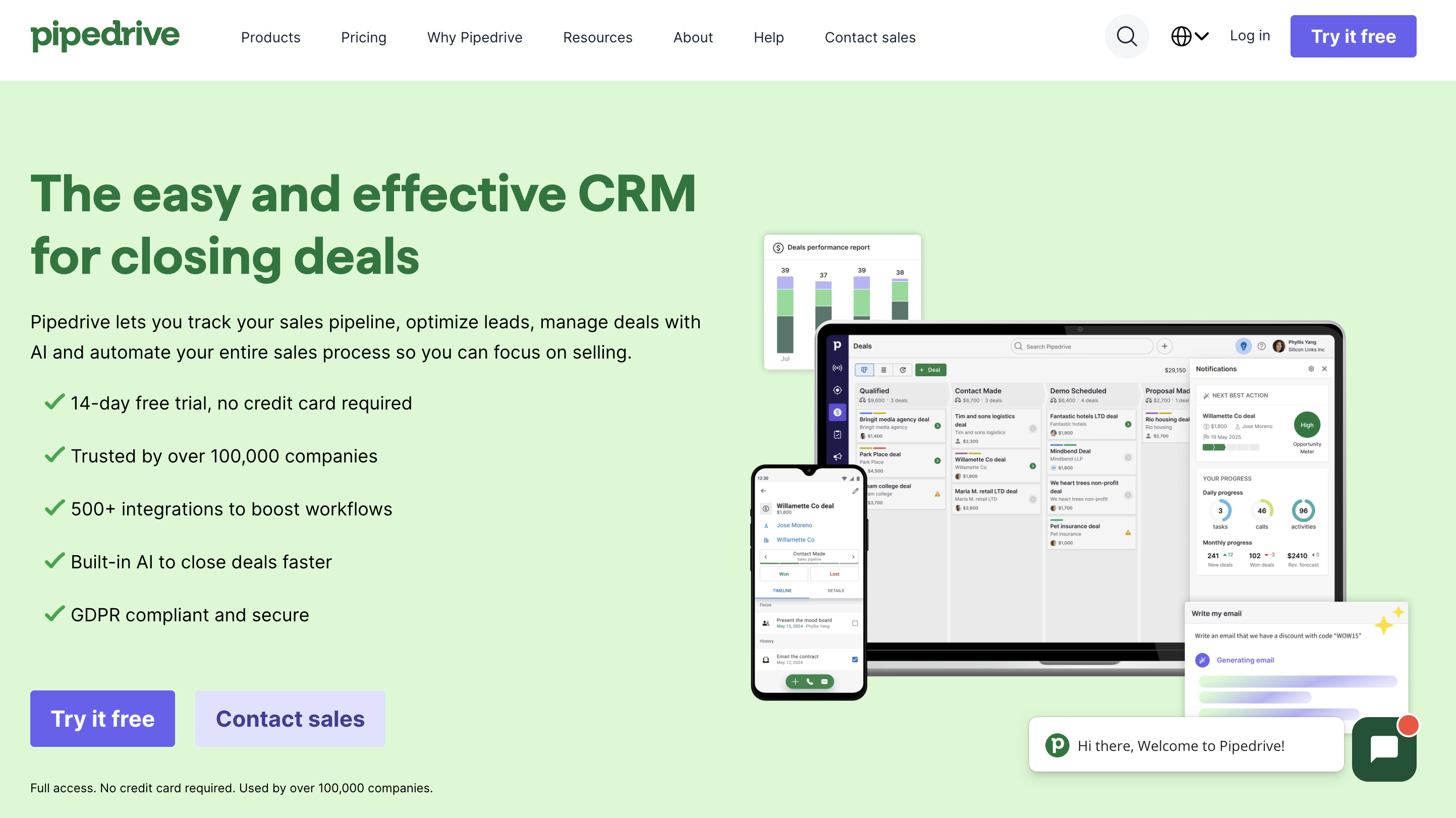
Pipedrive helps sales teams, including those in the energy sector, visualize and manage complex sales pipelines while automating repetitive tasks to focus on relationship-building and deal progression.
Key features:
- Visual pipeline management with customizable stages that can be adapted to fit energy project phases, from initial contact to regulatory approval.
- AI-powered sales assistant that analyzes deal patterns and provides data-driven recommendations to help close deals faster.
- Workflow automation for follow-ups, compliance tracking, and stakeholder communications throughout extended sales cycles.
Pricing:
All plans are priced per user/month and billed annually. VAT is not included.
- Essential: $14/month
- Advanced: $29/month
- Professional: $49/month
- Power: $64/month
- Enterprise: $99/month
- Add-ons for lead generation and project management are available, with prices varying. For example, the LeadBooster add-on starts at $32.50/month.
- 14-day free trial available with no credit card required.
Considerations:
- Lacks the specialized customer service and field operations capabilities found in comprehensive, industry-specific energy solutions.
- The entry-level Essential plan lacks key features like two-way email syncing, and more comprehensive automation tools are reserved for higher-tier plans.
8. Creatio
Creatio provides a unified no-code platform that merges powerful business process management with AI-native automation, tailored for complex energy workflows. The platform is particularly adept at handling intricate approval processes and regulatory compliance requirements, making it a strong choice for energy companies that manage multi-layered operational procedures. Its composable architecture empowers both technical and non-technical users to build custom applications without extensive coding.
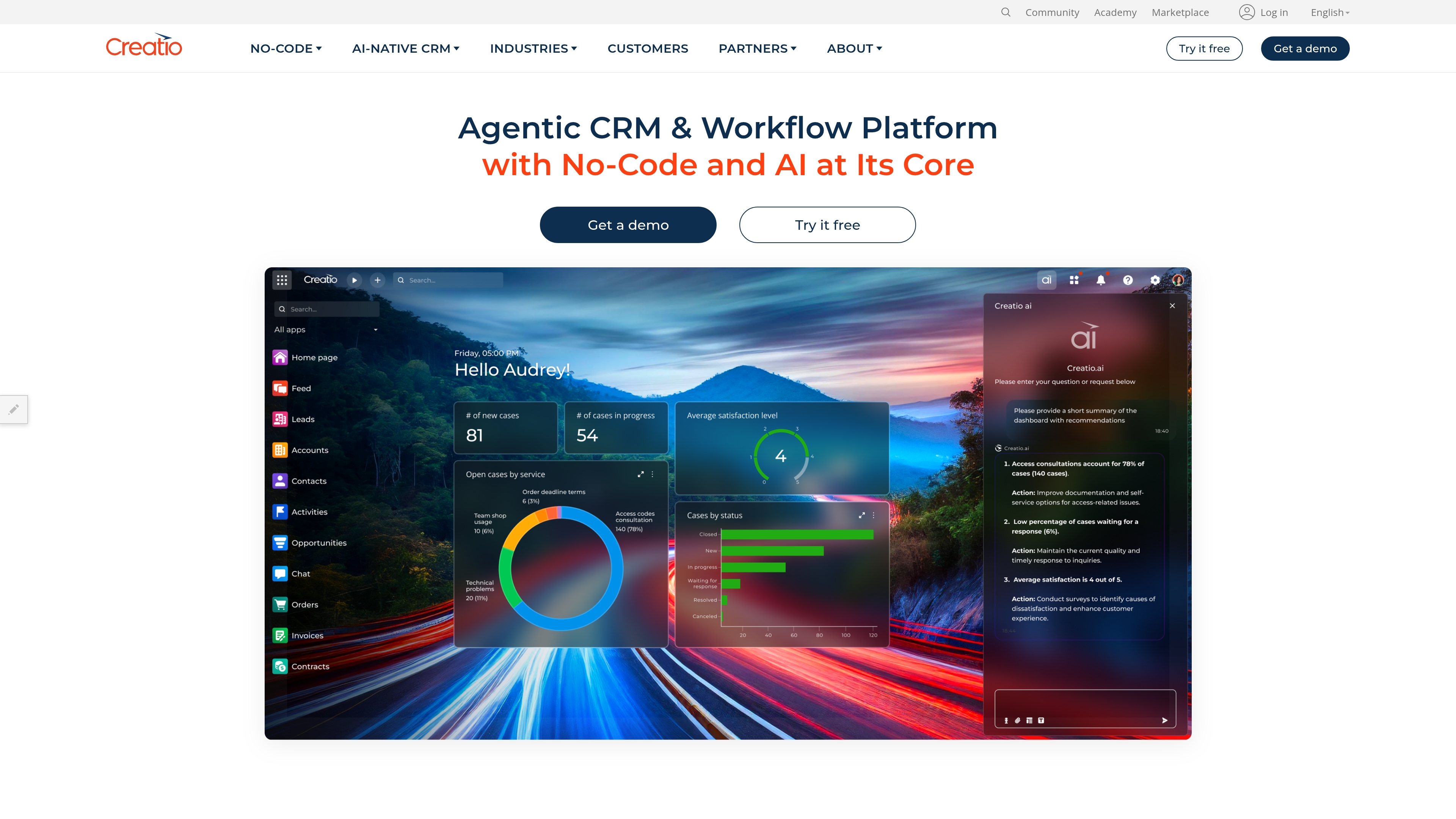
Creatio excels at automating end-to-end customer journeys while managing complex internal workflows, making it particularly valuable for energy companies that need to coordinate multiple departments and regulatory touchpoints.
Key features:
- Visual process designer with drag-and-drop tools for creating custom workflows without coding expertise
- Native AI automation that provides predictive scoring, lead qualification, and intelligent process recommendations
- Unified platform combining sales, marketing, and service modules with integrated business process management capabilities
Pricing:
- Growth: $25/user/month for SMB automation needs
- Enterprise: $55/user/month for full-scale corporate automation
- Unlimited: $85/user/month for advanced enterprise scenarios
- Sales module: $15/user/month for end-to-end sales management
- Marketing module: $15/user/month for multichannel campaign orchestration
- Service module: $15/user/month for intelligent service management
- Minimum purchase: $10,000 per year with standard 3-year contract terms
Considerations:
- Complex pricing structure can be overwhelming for smaller energy companies with straightforward CRM needs
- Extensive customization options may require more technical expertise than the “no-code” positioning suggests, particularly for advanced workflow automation
9. Freshsales
As an all-in-one CRM platform, Freshsales integrates sales automation, marketing tools, and built-in communication features designed for growing businesses. The platform’s AI-powered insights and multi-channel customer engagement capabilities are particularly valuable for energy companies that need to manage complex customer relationships and service communications effectively.
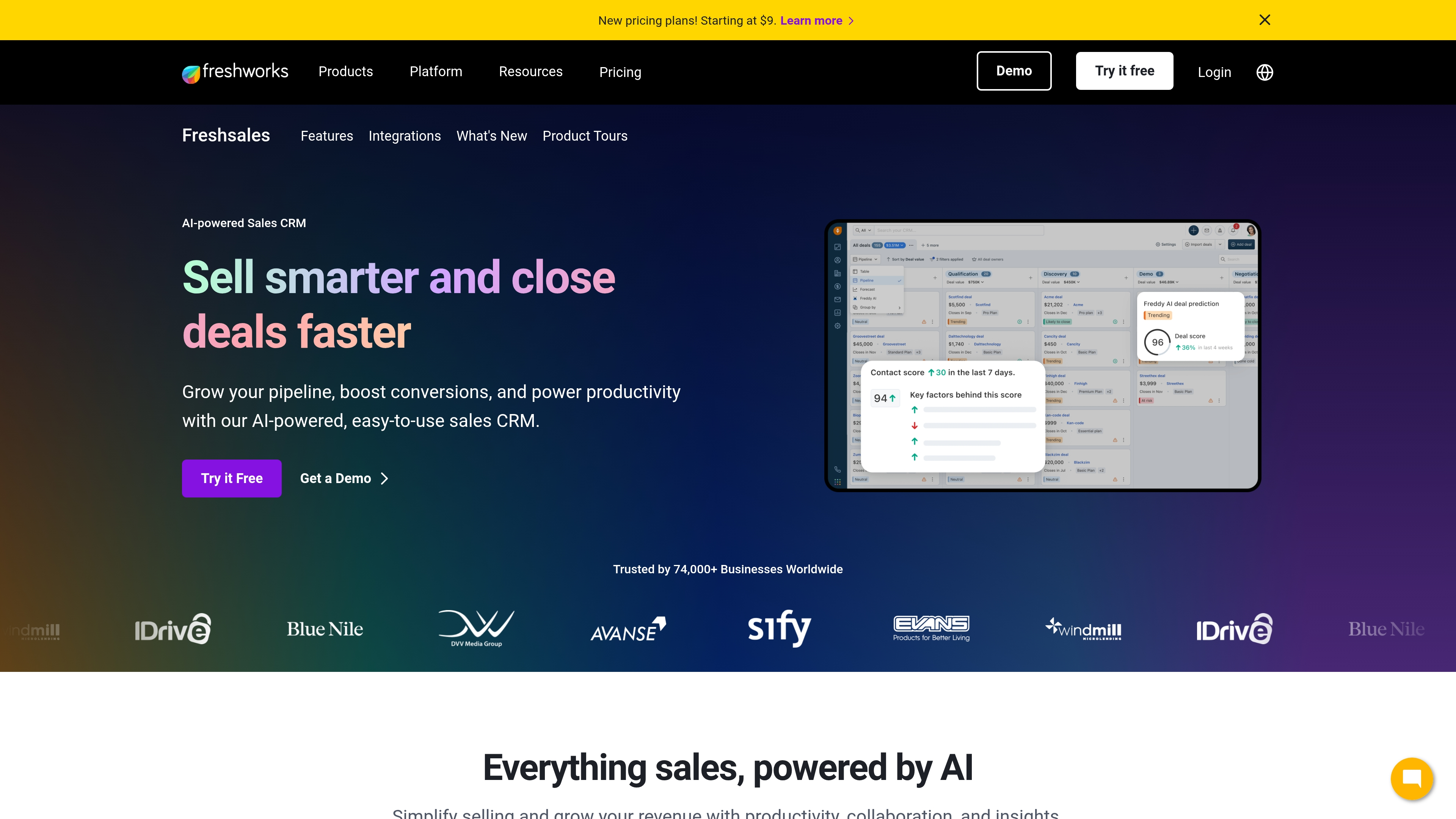
Freshsales helps energy companies streamline customer service operations and automate outage communications through integrated phone, email, and chat capabilities within a single platform.
Key features:
- Built-in phone system with call recording and one-click dialing for immediate customer response during service disruptions
- AI-powered lead scoring and deal insights to prioritize high-value commercial energy accounts
- Multi-channel communication hub supporting email, SMS, WhatsApp, and live chat for comprehensive customer engagement
Pricing:
- Free: $0 for up to 3 users
- Growth: $9/user/month (billed annually)
- Pro: $39/user/month (billed annually)
- Enterprise: $59/user/month (billed annually)
- AI agent sessions: $100 for 1,000 sessions (available on all plans)
- Configure, Price, Quote (CPQ): $19/user/month add-on
Considerations:
- Limited advanced reporting capabilities may not meet complex energy sector compliance requirements
- Fewer native integrations compared to enterprise-focused CRM platforms, potentially requiring additional third-party connections for specialized energy management systems
10. Sugar CRM
Built on a foundation of open-source flexibility, Sugar CRM offers a highly customizable platform well-suited for energy companies with unique operational requirements. The platform’s specialization in deep customization and on-premise deployment options makes it an excellent choice for energy organizations that require strict data control and industry-specific workflows.
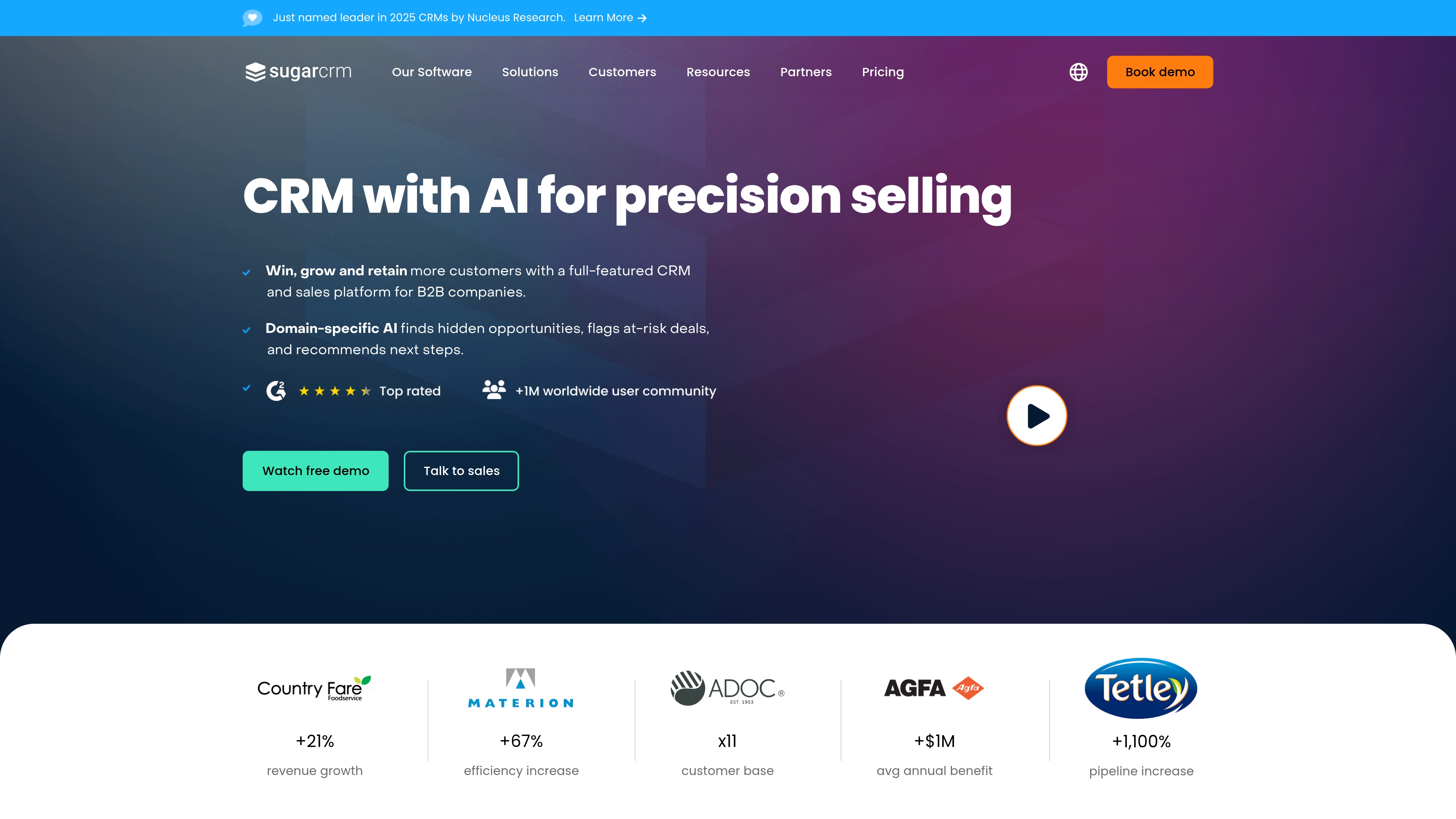
Sugar CRM’s time-aware customer experience platform captures every interaction throughout complex energy project lifecycles, providing historical context and predictive insights that help energy companies manage long sales cycles and multi-stakeholder relationships.
Key features:
- Time-aware CX platform: Captures and analyzes every customer interaction change over time, enabling energy companies to track project evolution and predict outcomes across extended development cycles
- Flexible deployment options: Offers on-premise, private cloud, and public cloud solutions to meet strict energy sector compliance and data residency requirements
- No-touch information management: Automatically gathers and enriches customer data from emails, calls, and ERP systems, reducing manual data entry for field teams and project managers
Pricing:
- Sugar Sell Standard: $59/month per user (billed annually, 15 user minimum)
- Sugar Sell Advanced: $85/month per user (billed annually, 15 user minimum)
- Sugar Sell Premier: $135/month per user (billed annually, 15 user minimum)
- Sugar Market: $1,000/month (billed annually, includes 10,000 contacts and unlimited users)
- Sugar Serve: $80/month per user (billed annually)
- Sugar Enterprise (On-premises): $85/month per user (billed annually)
Considerations:
- Steep learning curve for non-technical users, requiring significant training investment for energy teams transitioning from legacy systems
- Advanced AI and automation features are limited to higher-priced tiers, potentially increasing costs for energy companies needing predictive analytics for project forecasting
How to select the right energy CRM solution
Choosing a CRM for your energy team goes beyond checking off features. The right platform and delivers capabilities that far exceed a basic contact database.
Your team juggles regulatory compliance, field service coordination, and massive volumes of customer data daily. A powerful CRM becomes your command center, automating repetitive work and connecting everyone from sales to service so you can focus on what matters: closing deals and delighting customers.
Use this strategic guide to choose with confidence. These four steps will help you identify a platform built to accelerate your sales process and unify your operations.
Step 1: Map your current tech ecosystem
Start with a quick inventory of the systems your team uses daily: billing platforms, field service tools, and even those critical spreadsheets holding everything together. Identify where data gets stuck or where your team wastes time on duplicate entry. This audit reveals exactly what your new CRM needs to connect.
Track how customer information flows between sales, service, and field teams. These data pathways show where a unified platform like monday CRM can eliminate silos and give everyone instant access to complete customer profiles.
Step 2: Document your real-world workflows
Map how work actually gets done: from initial customer contact through resolution and follow-up. Examine the distinct processes for residential, commercial, and industrial accounts to spot what’s working and where automation can help. This isn’t about finding problems; it’s about uncovering opportunities.
Don’t forget to plan for the unexpected: service outages, billing disputes, emergency repairs. Understanding how your team collaborates during these moments reveals whether a CRM can handle reality, not just an idealized sales pipeline.
Step 3: Prioritize seamless integrations
Your CRM should connect effortlessly with the tools you already rely on. Look for platforms offering extensive pre-built integrations plus the flexibility to link with specialized energy systems. Automatic data syncing eliminates manual work and keeps everyone aligned.
The goal? One reliable source of truth across every platform, from sales to billing to field operations. When your entire team works from the same real-time data, decisions get faster and more confident.
Step 4: Build for tomorrow, not just today
The energy sector never stands still. Your CRM needs to scale as you add solar services, expand territories, or launch new programs. Choose a platform that adapts to your business rather than forcing you into rigid structures.
With monday CRM, start with core sales functionality and expand into project management or customer service as needs evolve. You’re building a flexible foundation that empowers your team to innovate and win, no matter what comes next.
Try monday CRMWhy monday CRM is the playbook your energy team needs
The energy sector operates at a unique velocity, demanding a careful balance between complex regulations and even more complex customer relationships. Your team requires a strategic framework that can keep pace. We designed monday CRM to be that framework, giving you the power to adapt, align, and win.
Adapt in real time with full team autonomy
When regulations change overnight, your team cannot afford to wait for a complex CRM update. Our no-code platform puts you in the driver’s seat, allowing you to adjust workflows and deal stages with simple drag-and-drop functionality.
This means your operations manager can instantly build new compliance trackers while your service team automates outage alerts. It’s about giving your team the agility to respond to the market, not the limitations of your software.
Let your new AI teammate do the heavy lifting
Your business operates on massive volumes of data; monday CRM helps you transform that data into your next strategic advantage. Our AI automates routine work (such as categorizing service requests and extracting key information from regulatory filings) so your team can focus on high-value activities.
Imagine your AI flagging high-usage customers who are ideal candidates for a solar upgrade or predicting churn risks based on billing patterns. These are the game-changing insights that move the needle, delivered automatically so you can act decisively.
Finally, a single source of truth
Your technology stack is specialized, and your CRM should connect to it without requiring a massive IT project. We integrate seamlessly with your utility billing, smart meter, and field service tools to create one unified view of the entire customer journey.
Our marketplace of pre-built connectors gets your ecosystem connected right out of the box, giving your team the data they need without the headache.
Ready to build a faster, more confident team? Try monday CRM
FAQs about CRM for energy companies
How does CRM software integrate with smart meter data systems?
CRMs connect with smart meter systems via APIs, pulling real-time usage data directly into customer profiles for proactive service and accurate billing. This allows teams to provide personalized energy efficiency recommendations based on actual consumption.
What is the typical return on investment timeline for energy CRM implementation?
Most energy companies see a return on investment within 6-12 months, driven by operational savings from automation and improved service efficiency. User-friendly platforms like monday CRM can accelerate this timeline with quick deployment and minimal training.
Can CRM platforms handle both residential and commercial energy customer types?
Yes, a flexible CRM easily manages both residential and commercial customers by using customized pipelines, billing structures, and communication workflows for each segment.
How does CRM software support renewable energy certificate tracking and management?
CRMs track renewable energy credits and green energy programs using custom fields and automated workflows to ensure regulatory compliance. This simplifies record-keeping for certificate transfers, program enrollment, and audits.
What level of training do utility staff members need for effective CRM adoption?
On an intuitive platform, staff typically only need a few hours of training to master core functions. Platforms like monday CRM reduce adoption time with a familiar interface, turning weeks of training into a few focused sessions.
How does CRM software ensure compliance with energy sector data privacy regulations?
Modern CRMs ensure compliance with enterprise-grade security features like data encryption, role-based access controls, and detailed audit trails. They also support data residency options to help meet strict regulations like NERC CIP.
